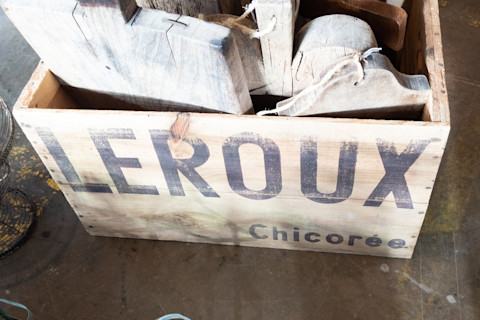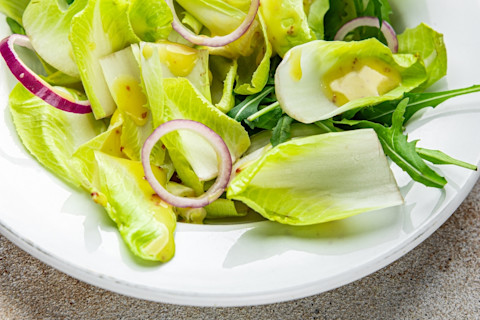Chicory appears to be having a moment. Although the plant’s use has long been associated with New Orleans coffee, it is catching on globally. Some people are using it as a coffee supplement. Others are completely replacing coffee with chicory. And still others are adding it to other foods, for a variety of purported health benefits.
Whatever the uses and reasons behind them, chicory sales are booming. One report estimated the global chicory market at $685 million in 2020 and is projected to hit $905 million next year.
Perhaps the most famous use of chicory is at the Café du Monde in The Big Easy. The café has long added chicory root to its dark-roasted beans to up its café au lait’s roasty-toasty flavor. First-time visitors to the city are almost obliged to frequent the café, sample the beverage, and nibble a beignet.
What Is Chicory?

(Credit: Guru Smile/Shutterstock)
Guru Smile/Shutterstock
But chicory has been around long before that café opened its doors. And its use hasn’t been limited to New Orleans. People have long roasted and ground the root of the leafy herb related to the dandelion (Chicorium Intybus, subspecies Sativum), then used it to either supplement or replace coffee.
Read More: Coffee: A Most Enigmatic, Ubiquitous Beverage
The Origins of Chicory

(Credit: sylv1rob1/Shutterstock)
sylv1rob1/Shutterstock
The first known use of the plant dates back over 5,000 years, by the ancient Egyptians. They used it as a beverage, a medicine, and vegetable.
It re-emerged in Northern Europe in the 18th century. The use of chicory in coffee dates back to Northern Europe in the Prussian Empire. Evidently, Germans then were see-sawing “…from a state of permanent inebriation [to] permanent caffeination”, according to Coffee: A Dark History.
Frederick the Great was not pleased. He was concerned that drinking imported coffee, rather than home-grown beer, would economically injure his kingdom. He banned coffee imports in 1766, forcing Germans to search out alternatives. Many turned to chicory.
Napoleon, too, had imports on his mind. In 1866, he imposed a large-scale embargo against British trade. The French turned to chicory as a coffee additive, to stretch their supply. The habit stuck, even after Napoleon retreated from Moscow and his ban collapsed in 1812. Chicory-enhanced coffee eventually made its way to the French New Orleans. When the Civil War interrupted shipping, Big Easy residents leaned on the plant to stretch their coffee supply.
Read More: 5 Ancient Foods Still Eaten Today
Does Chicory Contain Caffeine?

(Credit: 13Smile/Shutterstock)
13Smile/Shutterstock
One of the reasons the Germans were probably displeased with replacing coffee beans with chicory roots was that it did not contain caffeine. That meant recovering from the effects of strong German beers the night before became just a bit more difficult.
The use of chicory in France probably stuck because it used chicory to enhance the flavor of coffee, not replace it. The French generally roast their beans longer, making them darker and less acidic. Adding chicory root enhances the dark roast with a fuller flavor.
Read More: Why Caffeine Affects People Differently
What Does Chicory Look and Taste Like?

(Credit: Victoria Moloman/Shutterstock)
Victoria Moloman/Shutterstock
Its leaves resemble a dandelion, to which it’s related. But its vibrant flower, which can be blue, pink, or white, looks a bit like a daisy’s.
Like its dandelion relative, chicory has a long, thick root. When the root is roasted and ground, it looks, smells, and tastes like coffee.
Some people use the leaves for salads — but they tend to be bitter. Boiling them mellows that flavor. The flower buds are also edible, but don’t taste like much. Chefs sometimes use them to dress up salads. Other people sometimes pickle them.
Read More: A Common Yellow Weed, Dandelion May Have Distinct Health Benefits
Chicory’s Health Benefits

(Credit: Alesia.Bierliezova/Shutterstock)
Alesia.Bierliezova/Shutterstock
People are now turning to chicory to either reduce or eliminate caffeine from their diet. They are making this shift intentionally for health benefits, not based on the economic interests of some king or emperor.
People are finding other values to chicory beyond reducing or eliminating their caffeine intake. Some of these reasons may circle back to Egyptians’ medicinal uses of the plant.
For instance, chicory boosts gut health. It does so by acting as a pre-biotic — essentially providing nutrition to the good bacteria that lives in our colons. This aids the gut microbiome, which plays a major role in digestion, as well as overall health and well-being.
It has also been used as an anti-fungal and anti-microbial agent. Its chemical composition might make it “heart healthy” and help protect against cancer — although more research is needed. When considering adding chicory to your diet for health reasons, check with a physician.
With people now using chicory for food and medicine, as well as coffee additive and replacement. The plant has circled back to its roots.
Read More: It Doesn't Take Long to Reset Your Gut Health With Small Lifestyle Changes
Article Sources
Our writers at Discovermagazine.com use peer-reviewed studies and high-quality sources for our articles, and our editors review for scientific accuracy and editorial standards. Review the sources used below for this article:
Markets and Markets. Chicory market
Coffee: A Dark History. Chapter 8 - The Continental System and Napoleon's ALternative to Coffee
Pharmaceuticals. Chicory Extracts and Sesquiterpene Lactones Show Potent Activity against Bacterial and Fungal Pathogens
International Journal of Microbiology. Antimicrobial Effects of Egyptian Local Chicory, Cichorium endivia subsp. Pumilum
Scientia Pharmaceutica. Medicinal Use of Chicory (Cichorium intybus L.)
Before joining Discover Magazine, Paul spent over 20 years as a science journalist, specializing in U.S. life science policy and global scientific career issues. He began his career in newspapers, but switched to scientific magazines. His work has appeared in publications including Science News, Science, Nature, and Scientific American.














